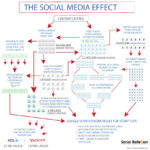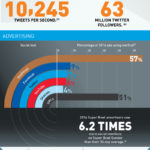For all the many changes that the internet has brought about, social media is arguably one of the most significant. Almost everyone utilizes one social media platform or another regularly, with the result being an immense change in how people communicate and interact with each other, not just online but in the “real world” as well.
The social media effect is palpable. You can share content one day and the next thing you know, your website is gaining traffic because people responded to your content. Furthermore, people are consuming social media videos at an incredible rate. In a matter of five months, advertisers on Instagram registered a 622% increase in impressions from videos.
Businesses, in particular, have come around to realizing just how valuable social media is for their marketing efforts. Much of video marketing relies on the increased opportunities that social media channels provide in terms of establishing stronger and more lasting connections with audiences. By utilizing social media in their marketing campaigns, businesses can achieve greater visibility, enhance brand recall, and improve audience perceptions. Best of all, they gain many of the benefits provided by traditional marketing at a much lower cost.
YouTube: Changing Our Relationship with Entertainment
If there is one platform that has almost singlehandedly changed our relationship with entertainment, it would have to be YouTube. The hugely-successful video sharing site is currently the second-highest-ranking search engine on the internet, eclipsed only by Google. It is also one of the most popular social platforms, second only to Facebook in terms of active monthly users. YouTube currently has more than 1.9 billion users all over the world.
YouTube has made it possible for anyone to create a video, enabling brands and consumers to coexist in a vast video ecosystem where creators have traditionally struggled to stand out. And with close to two billion people watching videos on the platform every month, marketers have a huge potential market to tap into.
Music
YouTube seems to be tailor-made for the music experience, providing established artists, undiscovered acts, and even hobbyists an equal platform on which they could be heard. Success stories such as Justin Bieber’s and Ed Sheeran’s highlight the power of YouTube to make stars out of anyone outside of the traditional music industry machinery. Anyone from any part of the globe can now upload their music and be able to reach audiences with the same breadth and scope as artists signed to major record labels. These days, you could just as easily watch YouTube videos of undiscovered talents playing music out of their bedrooms as you would multimillion-dollar videos from A-list music celebrities.
ASMR
Autonomous Sensory Meridian Response (ASMR) is one of the hottest buzz phrases in the online world these days, topping search engine queries in the United States and all over the world. As many as 8.2 million searches for “ASMR” are done in the U.S. and more than 25.7 million worldwide every month. As expected, ASMR is also a widely searched phenomenon on YouTube.
ASMR videos are similar to typical guided relaxation, meditation, or hypnosis induction videos in many ways. They often feature personable narrators speaking in calm, gentle voices, and the delivery is typically languid and relaxing. Most ASMR videos incorporate sequences of activities that produce sounds that many people find calming or soothing, such as soft whispering, brushing hair, or even gently tearing pieces of paper. For many people, the actions shown in ASMR videos help bring about relaxation and relief from stress, worry, and depression.
Video Games
YouTube has also had a significant impact on the world of gaming. From reviews and game unboxing to playthrough videos, gaming-oriented content on YouTube provides a feasible alternative to traditional gaming channels on the internet. In fact, the availability of a wide range of gaming-related content on YouTube has made traditional game review sites outdated and even irrelevant.
For gamers of all levels, the appeal of accessing gaming content on YouTube is easy to understand. It is easier to get an idea of what a game is about by watching someone play it than by reading pages of text, no matter how descriptive and well-written. And with more YouTube gaming personalities sharing news, release updates, and opinion via the video-sharing site, gamers have ready access to up-to-the-minute information that they can’t get anywhere else.
Influencers: Changing How Brands and Consumers Interact
Influencers and social media creators have achieved widespread prominence in recent years, due to their ability to shape discourse and influence the way people make decisions and perform actions online. As many as 43% of people aged 25 to 34 years old are likely to follow influencers on Facebook. On Instagram, the percentage of 19 to 24 year-olds likely to follow influencers is as high as 53%.
Influencers and content creators share some similar functions and characteristics, but there are some important differences between them. Content creators are primarily responsible for generating content and are often artists working in visual, literary, and other creative mediums.
Content creators serve an important function in marketing, assuming some of the responsibilities typically assigned to in-house creative teams. Businesses striving to feed the increasingly growing demand for content often turn to external content creators to supplement the work of their creative departments.
For many companies, content creators are essential for building libraries of creative assets, and more often function as creative partners than contractual employees. Some of the more successful content creators are Joseph Sherman (@shermyszn), who produces branded Instagram content for the retail firm, and Juliane Falk (@shotbyfalkpictures) and Damian Denis (@dou.bled), both of who produce Instagram visuals for Reebok.
Online influencers don’t actually generate content. Instead, they serve as distribution channels for content produced by companies and content creators. They primarily work to increase exposure for brands or products, making them just as essential to companies’ marketing efforts as content creators.
Although influencers generally do not produce content, the online savvy and strategy that they possess can be just as essential for marketing. For example, Kenny Gonzales (@the_perfect_pair) has helped sneaker-protection manufacturer Crep Protect connect with the tightly-knit sneaker community.
Instagram: Changing Our Relationship with Images
Instagram is yet another popular social media channel that has made a massive impact on marketing, communications, and society in general. It is estimated that as many as one billion people all over the world use Instagram every month, with 500 million accessing Instagram Stories daily.
It is interesting to note that as many as 89% of the site’s users are people from outside the United States. Of the one billion regular Instagram users monthly, only a relatively modest 110 million are U.S.-based. Even so, the number of Instagram users in the U.S. is expected to increase to 112.5 million by 2020. This figure represents a 5.4% increase over the number of U.S. users in 2019. Furthermore, there will be an estimated 117.2 million Instagram users in the country by 2021.
Along with Facebook, Instagram is largely responsible for the widespread ‘selfie’ phenomenon, which has taken the world by storm. Many people now take selfies solely to post them on Instagram, and even celebrities have gotten in on the trend. Nowadays, you could pretty much expect celebrity selfies to appear on blogs and social media sites all over the internet almost immediately after they were taken.
For marketers, the immense popularity and ubiquity of selfies is a significant development. They can be powerful and compelling marketing tools, helping inspire more positive feelings toward brands. For audiences that have become jaded and disillusioned by impersonal and “one-size-fits-all” marketing, selfies can be seen as a sign of authenticity and approachability. This, in turn, could inspire trust and confidence in a brand.
Facebook: Changing How We Communicate
A discussion on the impact of social media on American culture wouldn’t be complete without mentioning Facebook. Arguably the most popular social media platform that has ever existed, Facebook has become the standard against which most modes of communication in the 21st century have been measured.
The value of Facebook as a powerful marketing platform is firmly established at this point. Facebook has proven itself to be an excellent marketing tool due to its ability to facilitate open communication between brands and consumers.
Even Facebook’s built-in messaging app can be a potent tool for marketing-focused communication. A significant number of consumers all over the world are reaching out to businesses and services via Facebook Messenger, opening up a previously-underutilized channel for marketing and promotions.
Another significant development is the planned integration of Facebook’s Messenger with Instagram and WhatsApp, which will allow users of all three services to communicate easily with each other. For marketers, this development opens up new opportunities to reach even bigger and more diverse audiences.
Social Media: Changing Our Stories
So much of social media revolves around sharing stories. Every post that we make, every photo that we upload, and every video we share enables us to reach out and communicate with other people, whether friends and family or total strangers. It is now easier than ever to connect with other people, unhindered by the geographical and social limitations that have previously made communications impractical and even impossible.
The more accessible mode of communication benefits brands and companies, as well. Social media has brought consumers and brands together on the same platforms, enabling them to interact on the same channels. As more and more people find their voices and revel in the opportunity to share their unique stories, brands are also finding new channels to tell their own stories. This itself has changed the marketing experience in many significant ways, enabling companies to forge stronger and more powerful connections with their audiences.





